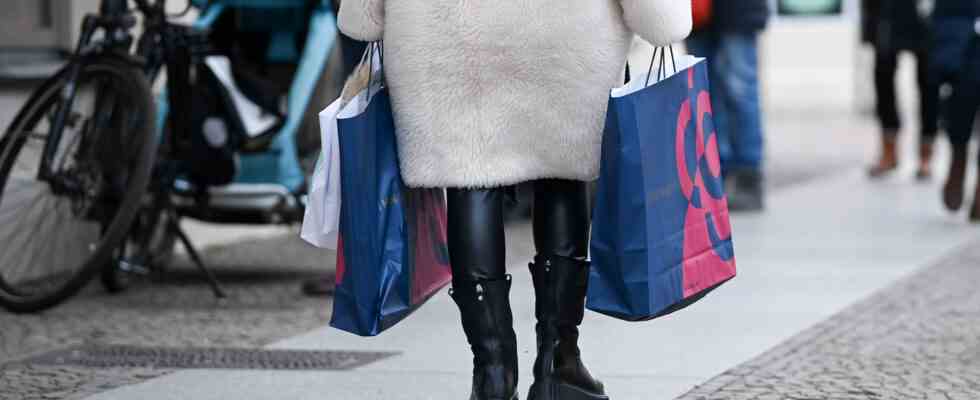Status: 10/27/2022 3:17 p.m
What else can I afford? Many Germans are currently asking themselves this question. The consumer climate is worse than during the two corona lockdowns, when retail had to close.
At first glance, everything looks the same as it always does in Münster’s pedestrian zone. It’s full, people are strolling through the city, rummaging through the shops. But the right buying mood does not arise for many. “The desire to shop is gone,” reports a passer-by. “You think a lot longer about whether you’re really going to buy the dress or the pants.”
Inflation dampens and lures in equal measure
Karin Eksen from the Münsteraner Handelsverband also observes reluctance to make impulse purchases and expensive purchases, and an overall subdued desire to buy. This is due to the energy costs, which are still unpredictable for many. If you have high reserves, don’t hold back so much. “But people who don’t have that easy money now have to think more carefully about what they can actually afford.”
Some would also consider what to buy now rather than in a few months when the product may have become more expensive due to inflation. “In times of high heating costs, some people quickly invest in warm clothing,” says Eksen.
No trend reversal despite improved climate
The data from GfK on the consumer climate agree with Eksen. In September, the value rushed to minus 36.8 points. For October, GfK recorded a value of minus 42.8 points. This means that the consumer climate is worse than during the two corona lockdowns, when retail had to close, says GfK expert Rolf Bürkl. “People’s income prospects are worse than they were then. The high energy and food prices are leading to high inflation, which is nipping at purchasing power.”
Although GfK is forecasting a slight improvement in consumer sentiment for November, Bürkl says this is not yet a trend reversal. Because it is not yet clear to what extent the measures decided by the government to cap energy prices will dampen inflation. “As long as inflation remains high and there are doubts about an unrestricted energy supply, the consumer climate will not be able to recover noticeably and sustainably.”
Germans are particularly sensitive
Experience has shown that price increases in Germany are always a sensitive area, explains Bürkl. This could also be related to the historical experience of hyperinflation and currency reforms, which many still know from stories told by grandparents or from history classes. “The last time we had this inflation of around ten percent was in the 1950s. Most of those who are alive today did not consciously experience it.
In the past few decades, the central banks have always aimed strongly at price stability, and consumers have had the impression that they can rely on it, says Bürkl. This reliability has now given way to uncertainty. “Currently, one has to assume that the inflation rate will remain high.” That worries many.
Adjustments to grocery shopping
How to deal with the current situation? Many people who don’t have much savings live in an apartment building complex in Leverkusen-Rheindorf. Many here have long since adjusted their buying behavior, reports resident Gabriele Mitsanis. “We used to eat meat several times a week, now we only do it once a week. And the cheese, which used to cost 2.79 euros and suddenly 3.79 euros, stays where it is.” You really have to turn over every penny.
Others, like Renate Thut, report that they cook differently – such as more stews and potato dishes – and that they throw away less. “I don’t think the next few months will be easy. You’re afraid of the future,” says Mitsanis.
Boom in social department stores
In Bonn’s social department store on Brüser Berg, they experience a reverse trend: the number of customers is increasing. There are children’s jackets, women’s blouses and men’s trousers, shoes in all colors and sizes – and in between there are many people who look and try on. About 200 people come here every day, according to the operators; including a growing number of middle-class people.
One of them is Naima Bulkhrif. She buys pants for her daughter. “My daughter always wants something new. But I can’t really afford it at the moment, there are other priorities at the moment.” She would rather save her money for electricity and heating bills, for more expensive groceries. After all, it is more sustainable to shop like this: “It would also be a shame to simply throw away things that are still good.”
Retail calls for help
The retail sector, on the other hand, expects income to fall due to people’s dwindling desire to buy. That’s a big concern for business owners and their employees, says trade association spokeswoman Eksen from Münster. “Profit margins in retail are very small, often amounting to only two percent of total sales.”
Many retailers simply have little leeway to absorb the increased costs for electricity and heating for them too. Eksen calls for state support measures for them – to prevent many companies from disappearing from the market.

